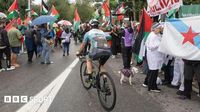Stage 16 of the 2025 Vuelta a España will be remembered not for its dramatic climbs or the thrilling sprint to the finish, but for the powerful intersection of sport and politics that brought chaos to the Spanish grand tour. On September 9, just 3 kilometers from the planned summit finish at Castro de Herville, a wave of pro-Palestinian protesters blocked the road, forcing organizers to cut the race short and declare Egan Bernal the stage winner at an improvised finish line 8 kilometers from the original end. The disruption marks the latest and most intense episode in a Vuelta that has been rocked by unprecedented activism targeting the Israel-Premier Tech (IPT) cycling team amid the ongoing war in Gaza.
For Bernal, who rides for Ineos Grenadiers, the victory was a bittersweet milestone. It was his first win since a life-threatening crash in 2022, a comeback story that would usually dominate headlines. Instead, the Colombian’s triumph was overshadowed by the extraordinary circumstances. Bernal out-sprinted Spain’s Mikel Landa (Soudal Quick-Step) to the new finish, clocking a time of 3 hours, 35 minutes, and 10 seconds. France’s Brieuc Rolland came in third, while British talent Finlay Pickering finished eighth. But as Bernal celebrated, the mood in the peloton remained tense and uncertain.
The protests, which have intensified since the Vuelta entered Spain on stage 5, are in direct response to the presence of the IPT team, owned by Israeli-Canadian billionaire Sylvan Adams. Demonstrators accuse the team of representing Israeli interests in the context of the Gaza conflict, a charge Adams and IPT management firmly reject. "The team is private; we don’t have to hide anything because we are not part of anything," said IPT’s sports director Óscar Guerrero, expressing frustration at the vitriol directed at his staff and riders. Despite the pressure, Adams has refused to withdraw IPT, calling such a move "a dangerous precedent." The team has even removed the word "Israel" from their jerseys, but their continued participation remains a lightning rod for protest.
Race director Javier Guillén has repeatedly affirmed that the Vuelta will proceed as planned, with no intention of canceling or rerouting the final stage scheduled for September 14 in Madrid. "We are going to continue with La Vuelta, and tomorrow we will start the next stage," Guillén declared after Tuesday’s chaos. "You cannot cut stages short, you cannot block the cyclists’ path. It’s illegal because it’s defined as such both in the penal code and in the sports law. We are a sport and sport is meant to unite. Anything that doesn’t serve that purpose isn’t linked to sport." Guillén also emphasized that IPT’s participation is sanctioned by the UCI, cycling’s governing body, and that no international federation has imposed sanctions requiring their exclusion.
The scale and persistence of the protests are unlike anything seen in professional cycling. While stage races have occasionally faced disruptions from environmental activists or local labor disputes, the intensity and political focus of the current demonstrations are unprecedented. Protesters have blocked roads, felled trees across the course, and even charged onto the race route, creating dangerous conditions for both riders and spectators. On stage 10, Intermarché’s Simone Petilli crashed while swerving through protesters. On stage 15, a protester’s dash toward the peloton led to a crash that forced Spain’s Javier Romo (Movistar) to abandon the race two days later. "It could have been a bigger tragedy after crashing at 50kph," Romo reflected. "They’ve screwed up La Vuelta for me, that’s obvious, and I don’t think I’m the one who has to pay for this."
The political backdrop in Spain has only added fuel to the fire. Just days before stage 16, Spanish Prime Minister Pedro Sanchez announced a suite of measures aimed at halting what he called "the genocide in Gaza," including an arms embargo on Israel and a ban on Israeli military vessels docking at Spanish ports. The government’s outspoken support for Palestine has energized protest groups, who have used the Vuelta’s global platform to amplify their message. Demonstrators have organized via social media, coordinating mass actions at key points along the route despite a heavy police presence. Authorities have responded by deploying an additional 450 officers for the upcoming time trial in Valladolid and preparing for more unrest during the final weekend in Madrid.
Amid the turmoil, the race itself has struggled to maintain its focus. The general classification after stage 16 sees Denmark’s Jonas Vingegaard (Visma-Lease a Bike) in the lead with a time of 61 hours, 16 minutes, and 35 seconds, holding a 48-second advantage over Portugal’s Joao Almeida (UAE Team Emirates). Great Britain’s Tom Pidcock (Q36.5 Pro Cycling) sits third, with other notable contenders including Jai Hindley, Giulio Pellizzari, and American Matthew Riccitello of IPT. Friday’s stage promises more action with a 143-kilometer medium mountain route from O Barco de Valdeorras to Ponferrada, but the specter of further disruptions looms large.
The riders themselves have expressed a mixture of sympathy and frustration. Race leader Vingegaard told Danish TV2, "I think those protesting do so here because they need a forum to be heard. They want the media to allow them that possibility to be heard, so they do it here. Of course, in a way, it’s a shame it happens exactly here [at the Vuelta], I think a lot of us [riders] think so, but again, I think they’re just desperate to be heard." The sentiment is echoed throughout the peloton, with many riders and staffers on edge about the unpredictable and potentially dangerous conditions created by the protests.
For now, the Vuelta a España rolls on, its fate intertwined with larger global forces far beyond the world of professional cycling. Race officials, police, and athletes are bracing for more unrest as the event enters its final days. Whether the race will reach its planned conclusion in Madrid remains uncertain, but one thing is clear: the 2025 Vuelta has become a stage for much more than sport, reflecting the passion, pain, and complexity of a world in turmoil.
As the peloton heads into the crucial mountain stages and the streets of Madrid await a dramatic finale, all eyes remain fixed on both the leaders’ jerseys and the protest lines. The outcome—on the road and beyond—hangs in the balance.



